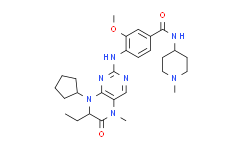| Cas No.: | 755038-02-9 |
| Chemical Name: | BI-2536 |
| Synonyms: | 4-[[(7R)-8-Cyclopentyl-7-ethyl-5,6,7,8-tetrahydro-5-methyl-6-oxo-2-pteridinyl]amino]-3-methoxy-N-(1-methyl-4-piperidinyl)benzamide;BI 2536;(R)-4-((8-Cyclopentyl-7-ethyl-5-methyl-6-oxo-5,6,7,8-tetrahydropteridin-2-yl)amino)-3-methoxy-N-(1-methylpiperidin-4-yl)benzamide;4-[[(7R)-8-cyclopentyl-7-ethyl-5-methyl-6-oxo-7H-pteridin-2-yl]amino]-3-methoxy-N-(1-methylpiperidin-4-yl)benzamide;Benzamide, 4-[[(7R)-8-cyclopentyl-7-ethyl-5,6,7,8-tetrahydro-5-methyl-6-oxo-2-pteridinyl]amino]-3-methoxy-N-(1-methyl-4-piperidinyl)-;BI 2536 (BI-2536);BI-2536;4-[[(7R)-8-cyclopentyl-7-ethyl-5,6,7,8-tetrahydro-5-methyl-6-oxo-2-pteridinyl]amino]-3-methoxy-N-(1-methyl-4-piperidinyl)-benzamide;4-[[(7R)-8-cyclopentyl-7-ethyl-5,6,7,8-tetrahydro-5-methyl-6-oxo-2-pteridinyl]amino]-3-methoxy-N-(1-methyl-4-piperidinyl)-benzamide,type II anhydrate;BI2536;4LJG22T9C6;4-{[(7r)-8-Cyclopentyl-7-Ethyl-5-Methyl-6-Oxo-5,6,7,8-Tetrahydropteridin-2-Yl]amino}-3-Methoxy-N-(1-Methylpiperidin-4-Yl)benzamide;C28H39N7O3;4-[[(7R)-8 |
| SMILES: | O=C1[C@@]([H])(C([H])([H])C([H])([H])[H])N(C2C(=C([H])N=C(N([H])C3C([H])=C([H])C(=C([H])C=3OC([H])([H])[H])C(N([H])C3([H])C([H])([H])C([H])([H])N(C([H])([H])[H])C([H])([H])C3([H])[H])=O)N=2)N1C([H])([H])[H])C1([H])C([H])([H])C([H])([H])C([H])([H])C1([H])[ |
| Formula: | C28H39N7O3 |
| M.Wt: | 521.6544 |
| Sotrage: | 2 years -20°C Powder, 2 weeks 4°C in DMSO, 6 months -80°C in DMSO |
| Description: | BI 2536 is a dual PLK1 and BRD4 inhibitor with IC50s of 0.83 and 25 nM, respectively. |
| In Vivo: | BI 2536 (40-50 mg/kg, i.v.) blocks the growth of human cancer xenografts in immunodeficient, nu/nu mice. Consecutive cycles of 40-50 mg/kg BI 2536 given i.v. once or twice per week are found to be highly efficacious in diverse xenograft models, such as the HCT 116 colon cancer with complete tumor suppression with the twice per week schedule (treated versus the control (T/C) value 0.3%) and a T/C value of 16% with once per week treatment; both schedules are well-tolerated, as judged by clinical signs and absence of major body-weight changes[3]. |
| In Vitro: | Exceeding a 100-fold concentration range starting at 10 nM, BI 2536 causes HeLa cells to accumulate with a 4N DNA content, indicative of a cell-cycle block in either G2 phase or mitosis. In addition to HeLa cells, BI 2536 potently inhibits the proliferation of a panel of 32 human cancer cell lines, representing diverse organ derivations (including carcinomas of the breast, colon, lung, pancreas, and prostate, melanomas, and hematopoietic cancers) and varied patterns of tumor suppressor or oncogene mutations (including RB1, TP53, PTEN, andKRAS status). The half-maximal effective concentration (EC50) values in this cell panel ranged 2-25 nM, whereas a concentration of 100 nM of BI 2536 is typically sufficient for inducing a complete mitotic arrest. The proliferation of exponentially growing hTERT-RPE1, human umbilical vein endothelial cells (HUVECs), and normal rat kidney (NRK) cells is blocked at EC50values ranging 12-31 nM, indicating a comparable sensitivity of cycling nontransformed cells to BI 2536[3]. |






















